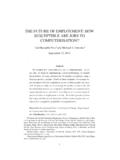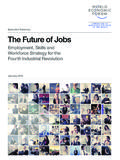Transcription of TRANSFORMATIVE TECHNOLOGIES …
1 Report for the Canadian G7 Innovation Ministers MeetingMONTREAL, CANADA 27-28 MARCH 2018 TRANSFORMATIVE TECHNOLOGIES AND jobs OF THE FUTUREThis report is issued under the responsibility of the Secretary-General of the OECD. It was prepared by the Directorate for Science, Technology and Innovation, under the strategic guidance of the Senior Counsellor to the Secretary-General and Sherpa Gabriela Ramos, at the request of the G7 Canadian Presidency for the G7 Innovation and Employment Ministerial "Preparing for jobs of the Future", held in Montreal, Canada, on 27-28 March 2018. The opinions expressed and arguments employed herein do not necessarily reflect the official views of OECD member countries or the G7. This report and any map included herein are without prejudice to the status of or sovereignty over any territory, to the delimitation of international frontiers and boundaries and to the name of any territory, city or area.
2 The statistical data for Israel are supplied by and under the responsibility of the relevant Israeli authorities. The use of such data by the OECD is without prejudice to the status of the Golan Heights, East Jerusalem and Israeli settlements in the West Bank under the terms of international law. OECD, 2018 TRANSFORMATIVE TECHNOLOGIES AND jobs OF THE FUTURE OECD, 2018 3 TABLE OF CONTENTS List of acronyms .. 4 Summary and 5 The impact of TRANSFORMATIVE TECHNOLOGIES on the economy and society .. 5 Artificial intelligence .. 6 Inclusive innovation .. 6 Preparing jobs for the future .. 7 Improving measurement of the digital transformation .. 8 1. Setting the scene .. 9 2. TRANSFORMATIVE TECHNOLOGIES .. 13 Artificial intelligence .. 13 The Internet of Things .. 15 Blockchain .. 15 Some implications .. 16 3. Economic transformation and society .. 17 Addressing the divides .. 17 Impacts on society .. 19 4. Inclusive innovation .. 20 The contribution of industry and innovation policies.
3 20 Digital TECHNOLOGIES and the inclusion of SMEs .. 21 Inclusion and sub-national regions .. 22 Fostering inclusion in a time of rapid technological change .. 22 5. Policy levers and labour force demand/supply issues .. 23 References .. 25 Figures Figure 1. Mobile broadband subscriptions and mobile data usage in G7 countries .. 9 Figure 2. Labour productivity growth in the long run .. 10 Figure 3. The divergence in multi-factor productivity growth .. 11 Figure 4. Artificial intelligence patents by top 2 000 R&D companies, by sector, 2012-14 .. 14 Figure 5. Gap in Internet use by educational attainment, 2016 .. 17 Figure 6. The average risk of automation varies by industry .. 18 Figure 7. Share of non-routine employment and ICT task intensity, 2012 or 2015 .. 23 TRANSFORMATIVE TECHNOLOGIES AND jobs OF THE FUTURE 4 OECD, 2018 List of acronyms AI artificial intelligence GB gigabyte GDP gross domestic product ICT information and communication technology IoT Internet of Things IP intellectual property IP5 Five Intellectual Property Offices NEET not in employment, education or training NFI Nouvelle France industrielle NSS National Security Strategy (United States) R&D research and development R&I research and innovation SMEs small and medium-sized enterprises STEM Science, technology, engineering and mathematics TRANSFORMATIVE TECHNOLOGIES AND jobs OF THE FUTURE OECD, 2018 5 Summary and recommendations This report focuses on the impacts of digital transformation on jobs and productivity and is intended as an input to discussion in the G7 Innovation Ministers track of the 2018 G7 Innovation and Employment Ministerial Preparing for jobs of the Future.
4 It complements the Discussion Note on the Future of Work prepared by the OECD to support the parallel meeting of G7 Employment Ministers, which looks specifically at how policies and practices designed for a world of work of the 20th century need to be adapted to ensure fair and rewarding employment opportunities for all in the future. The G7 has an important role to play in raising awareness of the transformation underway and can share experiences on how best to exploit the opportunities while effectively addressing the challenges. Such an exchange could focus on the design, implementation and evaluation of policies. The OECD can assist in this exchange and act as a clearing house in the dissemination of evidence and best practices. Beyond information sharing, the G7 can work on shared challenges that are international in nature. Four have risen up on the policy agenda: i) ensuring the strongest possible benefits of TRANSFORMATIVE TECHNOLOGIES on economies and societies, including the growing importance of data; ii ) developing a common approach to artificial intelligence (AI); iii ) fostering inclusive innovation; and iv) preparing for the jobs of the future.
5 There is also an overarching need to enhance measurement of the digital transformation so that an evidence base is established for effective policy making across these four policy challenges. The OECD stands ready to contribute to G7 discussions, facilitate further dialogue with stakeholders and support the implementation of evidence-based policies in these areas. Key messages from the report follow below. The impact of TRANSFORMATIVE TECHNOLOGIES on economies and societies A wide-ranging digital transformation is underway, affecting all economic sectors, characterised by almost universal connectivity and ubiquitous computing, and drawing on the generation and utilisation of vast amounts of data. This transformation has positive impacts on productivity for many firms, but has not yet translated into stronger productivity growth at the economy-wide level. Larger impacts could result from policy efforts to foster a more wide-spread diffusion of digital TECHNOLOGIES to all firms, notably to small and medium-sized enterprises (SMEs); greater investments in critical complementary assets such as firm-level skills, organisational change and process innovation; as well as support for further structural change to enable the growth of new business models and digitally-intensive businesses.
6 The wide scope of technological changes creates significant uncertainty about their future directions and impacts. Indeed, predictions about technological timelines are often inaccurate and overestimation of their short-run impacts is common. The list of TRANSFORMATIVE TECHNOLOGIES is long, but some TECHNOLOGIES have the potential to be particularly far-reaching, notably AI, the Internet of Things (IoT) and blockchain. These three TRANSFORMATIVE TECHNOLOGIES present some common features, notably their dependence on large data sets and a range of digital TECHNOLOGIES . They also have a strong potential to improve the design, implementation and evaluation of public policies. Greater technology convergence can be supported by cross-disciplinary co-operation, such as interdisciplinary research and development (R&D) and training. More needs to be done in G7 countries to overcome long-established mono-disciplinary institutional and organisational arrangements for funding and performing R&D.
7 New cross-disciplinary spaces, clusters, can support such convergence. Public sector research is often critical in supporting the development of TRANSFORMATIVE TECHNOLOGIES . Emerging TECHNOLOGIES carry several risks and uncertainties, and many also raise ethical issues. TRANSFORMATIVE TECHNOLOGIES AND jobs OF THE FUTURE 6 OECD, 2018 Not only the development but the effective diffusion of technology is important. Certain institutions, such as technology extension services, can play an important role in supporting the diffusion process but tend to receive low priority in existing innovation policies. Data is the essence of the digital transformation and increasingly underpins trade and the global economy, as well as science and innovation. Countries have different approaches to digital security risk management and privacy, as well as common challenges in bringing their regulatory environments up to speed with the digital age.
8 The value of multilateral and multi-stakeholder discussion on data and its governance cannot be underestimated. Artificial intelligence The international debate on AI has gained significant momentum in recent years. In the Takamatsu Ministerial Declaration of April 2016 (G7, 2016), G7 ICT Ministers agreed on the need to facilitate R&D and the adoption of emerging TECHNOLOGIES including AI, and to ensure policy frameworks take into account the broader societal and economic implications of such TECHNOLOGIES as they are developed. In September 2017, G7 ICT and Industry Ministers in Turin committed to a multi-stakeholder exchange on human centric AI for societies, reiterating the need for further information sharing and discussion to deepen the understanding of the broader potential effects of AI TECHNOLOGIES on society and economies, ranging from issues of privacy, transparency and accountability, to ethics, job creation and cybersecurity, and to explore multi-stakeholder approaches to AI-related policy and regulatory issues.
9 G7 countries agreed to continue to lead the effort towards a socially beneficial AI, with the support of the OECD. OECD work shows that AI is not constrained to the digital world, with significant patenting activity taking place also in sectors such as transport and machinery, and with wide potential for deployment in a range of services such as healthcare and finance. Reaping the benefits of AI will require policy action in a number of fields, however, and education and training systems will need to ensure young people and in-work adults are equipped with the right skills to perform in an AI-enabled environment. Inclusive innovation In 2016, between 73% and 98% of adults in G7 countries accessed the Internet, with access almost universal in Japan and the United Kingdom. But despite the rapid uptake of digital TECHNOLOGIES , divides remain, and the uptake of digital TECHNOLOGIES still differs by age, geography, education and income levels, although these gaps are closing with time.
10 Gender is particularly important in ensuring an inclusive transformation. Although women are underrepresented in many areas of the digital transformation, there are also new opportunities to empower women and strengthen their position in the labour market and in driving the digital transformation. Skills provide an important safeguard against the risk of automation. Fewer than 5% of workers with a tertiary degree are at a high risk of losing their job due to automation compared to 40% of workers with a lower secondary degree. To thrive in the digital era, all workers will need to be equipped with a wide set of skills, encompassing cognitive as well as non-cognitive and social skills (notably information and communication technology [ICT] skills; science, technology, engineering and mathematics [STEM] skills; and self-organisation skills). Beyond these general initiatives, measures targeted at underrepresented groups will be needed.

















